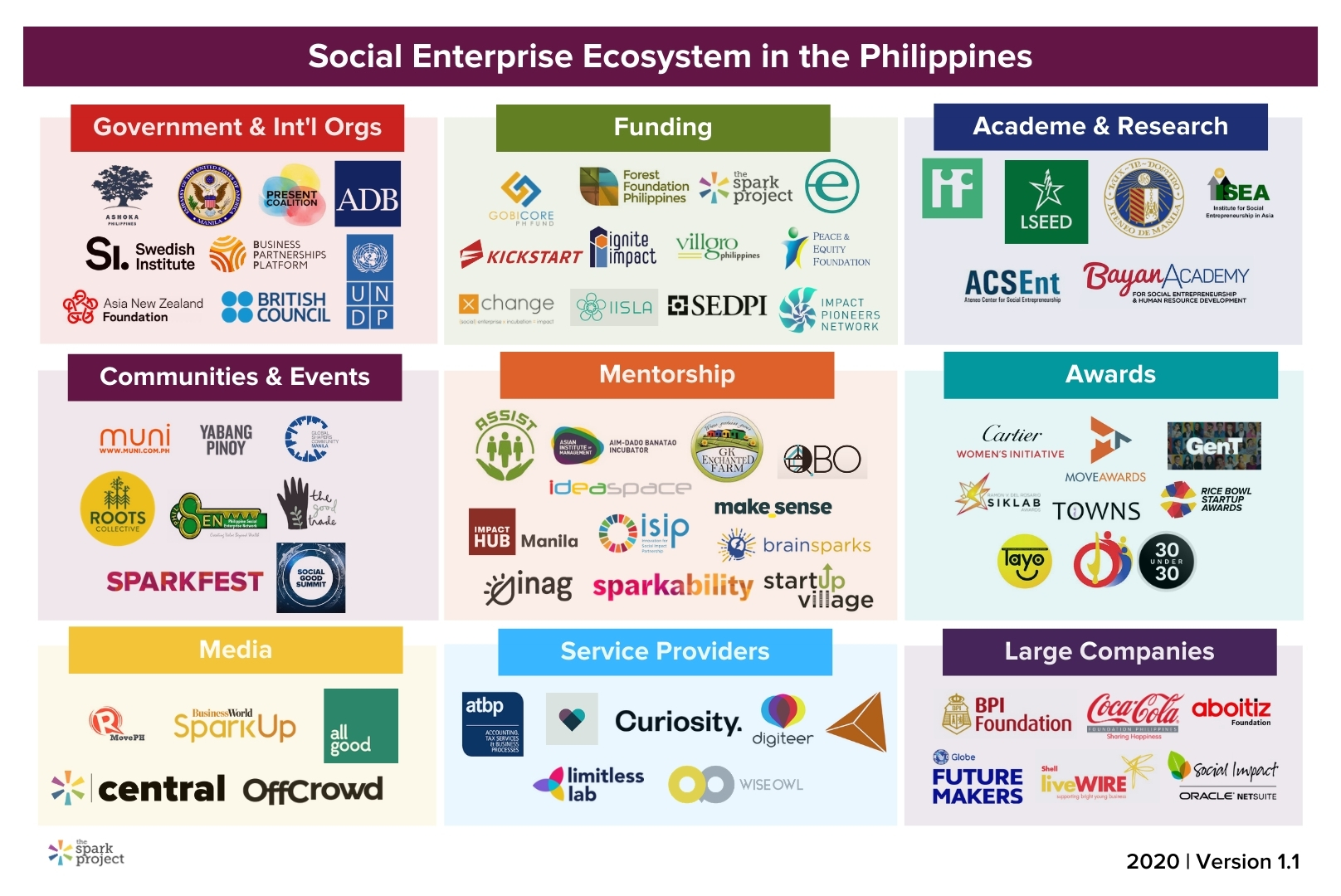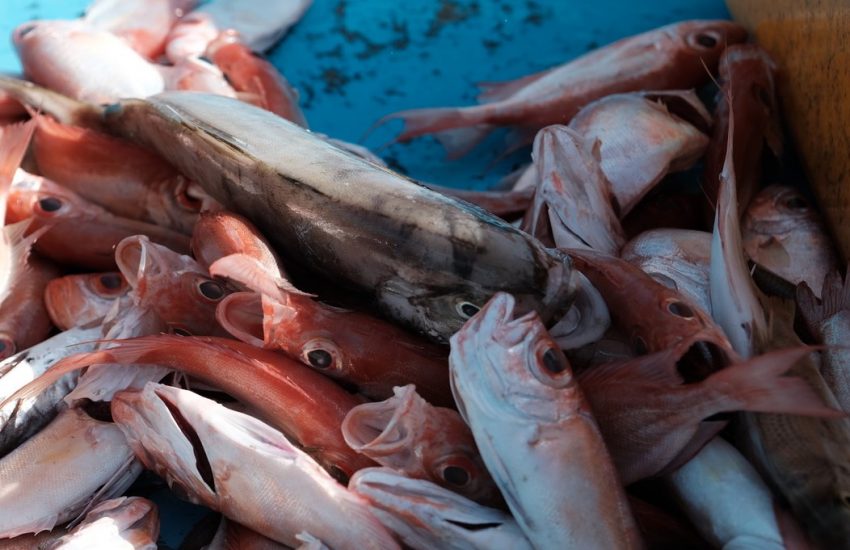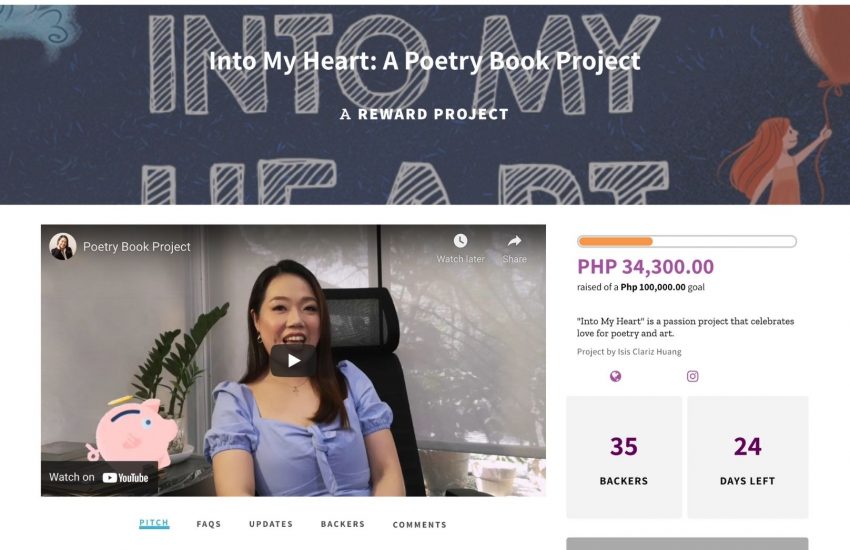Social Enterprise Ecosystem in the Philippines 2020: The Enablers
Social Entrepreneurship is making its way to becoming more commonplace in the Philippines. Especially during these unprecedented times due to COVID-19, businesses large and small are starting to take a second look at doing business as something that does not only drive profit but also create a positive impact on society. The British Council says that “the number of social enterprise start-ups has more than tripled in the last decade alone”. With the rise in social enterprises comes a rise in new learnings, challenges, and needs for those parts of this sector. Different actors in the community must work together and keep up with the constant need for support, resources, and innovation for social enterprises in the Philippines.
According to Brad Feld, the author of Startup Communities, a successful entrepreneurial ecosystem must be led by the entrepreneurs that make it up, must have a long term commitment to developing the space, must be inclusive and welcoming to anyone who wants to participate in it, and must have continual activities and events that serve the community. All startup ecosystems will have its leaders and feeders, and the interplay between these actors will directly affect the landscape that fosters these entrepreneurial activities. Through Brad Feld’s framework we, at The Spark Project, attempt to map out the leaders and feeders (collectively called enablers) that make up the Social Entrepreneurship Ecosystem in the Philippines. Our hope is that through this exercise, we get to have a better understanding of the current SE landscape and find ways in enriching it. We know that this snapshot is far from complete, and our invitation is for the community to join us as we crowdsource information to make this map even better.
Entrepreneurial Organizations
The leaders of the Philippine social enterprise community must be the social entrepreneurs who make up the space. These entrepreneurial organizations are formed and founded by entrepreneurs who want to help fellow entrepreneurs in their journey. These groups create an environment where social entrepreneurs are welcome, motivated, and inspired to start and scale their ideas. They create a safe space for aspiring and existing social entrepreneurs to learn, network, and share best practices and opportunities on social entrepreneurship.
In the Philippines, Yabang Pinoy is one of the oldest entrepreneurial communities in the ecosystem, serving as a platform for local and social enterprises through their Yabang Pinoy Bazaar. Other well-known and loved communities for product-based social enterprises are Roots Collective and The Good Trade. Muni.ph is another community that focuses on sustainable initiatives and supports enterprises that promote that. We also have international communities like the Global Shapers Community, that has hubs across the Philippines – Manila, Iloilo, Cebu, and Davao.
There aren’t a lot of communities at the moment that caters specifically to social enterprises. Those that do are usually purpose-driven organizations that aim to build and nurture communities of individuals who are passionate about creating positive change in their respective different communities, social entrepreneurship being one of the ways this is achieved.
Community Events
Community Events celebrate the wins we experience in the social enterprise space. These also initiate and continue conversations in the community about the challenges, developments, and opportunities that entrepreneurs can take. Both Entrepreneurial Communities and Community Events for social enterprises in the Philippines still have plenty of space for growth. With the growing number of Social Enterprises and Social Entrepreneurs in the country, there will be a demand for more communities and events to provide the support network SEs need.
Annual conferences like Spark Fest by The Spark Project and the Social Good Summit of Rappler, and monthly meetups like Impact Happy Hours organized by Villgro had to be put on hold for 2020 due to quarantine protocols. In the new normal, these events will definitely not be the same as they used to, but it will be interesting to see how this space will evolve in 2021.
Government and International Orgs programs or policies that favor SEs
The government’s role in the ecosystem is to support rather than lead. This cluster comprises organizations that enable entrepreneurs by helping establish the Social Entrepreneurship space both locally and globally. Organizations that are in this cluster have a large reach and have great influence. They are in good position to advocate Social Entrepreneurship as a means for innovation and problem-solving in society. They promote Social Entrepreneurship as a space to pay attention to because of the economic and social impact it can bring to the communities they serve. For now, opportunities available for SEs in this space mostly come from international organizations and governments, but local policy through the PRESENT Bill in our country is a potential game-changer and definitely a good sign of progress.
Universities that have SE programs or courses, and organizations that conduct research
The universities and research-driven organizations in this cluster conduct regular academic studies and promote learning about social entrepreneurship in the Philippines. From degree programs, elective courses, intensive training, to resource sharing – all of which are designed to foster an environment of experimentation, encouragement, and innovation for aspiring entrepreneurs and existing entrepreneurs. Organizations like Bayan Academy are active researchers and content producers for this space, and many Universities such as Ateneo de Manila and De La Salle University are integrating Social Entrepreneurship in their programs and academic curriculums, both in the undergraduate and graduate level. Universities hold an important role in the local SE ecosystem because they act as feeders to the ecosystem. They expose students on social entrepreneurship at an early stage. These institutions have the power to set the course for future social entrepreneurs and innovators who can potentially create sustainable businesses that do good.
Funders and Investors
The role of funders and investors is to inject capital resources that will help entrepreneurs be better equipped in running their respective social businesses. This is important for the SE ecosystem because impact-driven funders and investors provide the needed financial (and non-financial) support for entrepreneurs who are willing to put in the work to pursue this path. In the Philippines, there are financing sources available for SEs but most of these opportunities are particularly for scale-up social enterprises, and not for early-stage social enterprises. For early-stage SEs, grant competitions and crowdfunding are the go-to options, apart from self-funding.
Mentorship
This cluster comprises organizations that provide social enterprises with opportunities to advance and develop their impact, most often without asking for an economic return. This is usually done through incubators and accelerator programs. Communities in this cluster focus their attention on guiding businesses that they see have the potential to scale their impact. Some organizations in this cluster cater to social enterprises that target a specific sector or industry such as Agriculture, Women-led enterprises, Technology, and Sustainability.
Service Providers for SEs
Service Providers can span from Lawyers to Accountants, to Recruiters, to Marketing Consultants, and other specialized fields that provide much-needed assistance to social entrepreneurs. They can be either individuals or companies that invest their time and energy to provide quality and personalized services and help to early-stage companies. There are only a few enterprises in the Philippines such as Works of Heart and ATBP Co. that cater primarily to Social Enterprises and Mission-driven organizations, and it would be beneficial to the local ecosystem to have more of these types of organizations serving social enterprises.
Large Companies that have SE programs
Corporations that are well-established and well-known have the power and capacity to move the needle in the local SE space by supporting social entrepreneurs and innovators through company programs and policies that give these enterprises access to funding, capacity training, and other opportunities only they can provide. That is corporate citizenship. Companies such as Globe Telecom, BPI Foundation, ABS-CBN Foundation, MVP Group, and Pilipinas Shell are some of the large corporations that have enterprise development programs that have a strong focus on social entrepreneurship and social innovation. Having more corporations taking this part towards this kind of corporate citizenship will help mainstream social businesses and encourage more entrepreneurs to be more impact-driven.
Media
Media plays an important role in spreading the word about social entrepreneurship and social impact. They serve as conversation starters, evangelists, and advocates for social entrepreneurs by giving them a voice and a platform to share their message. In the Philippines, there are a handful of media outlets that showcase the work that social entrepreneurs are doing and their contribution to economic growth, and their impact on society.
Awards
Both Local and International Award giving bodies recognize the strides and notable achievements that have been made in the SE space. They put a spotlight on the work happening in this space and keep the conversation and support going for initiatives that have to create positive social impact. We have a handful of award-giving bodies that recognize the amazing work of social entrepreneurs and innovators here in the Philippines.
Conclusion
Although each of the actors in these clusters has a specific role they play in the ecosystem, they all have a unified goal of providing the best support for social enterprises across different stages. The Enablers that make up the Social Enterprise Ecosystem in the Philippines exist for the same reason that social enterprises exist, and that is to meet the needs of people, profit, planet, and purpose. They introduce a new paradigm of conscious capitalism where doing good and earning a profit can co-exist, and the marginalized sectors and communities in our society are not left behind.
These enablers make it possible for entrepreneurs to emerge, grow, and develop in this space. In the words of Thompson, “Entrepreneurship enablers are the ‘people behind the people’ who create and build businesses and social enterprises and thus help bring about economic and social regeneration”. With everything that COVID-19 has brought to the world of Entrepreneurship, and specifically Social Entrepreneurship, one can only hope that this catalyzes more growth and development in the local impact ecosystem in the Philippines. Let’s watch this space in 2021. And if you can, be part of this space.
Help us map the Social Enterprise Ecosystem in the Philippines. Contribute new enablers or suggest updates here.





